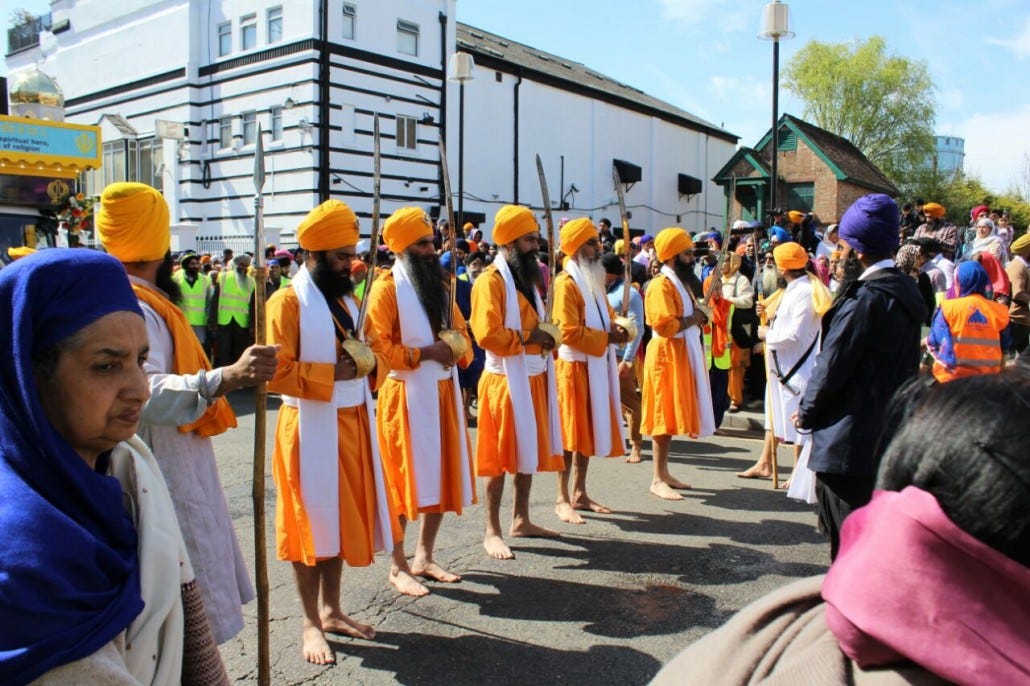Sukhraj Singh: We Must Outwardly Celebrate The Radical Anti-Caste Teachings Of The Khalsa
I strongly believe that the spirit of an assertive anti-caste Khalsa tradition withers each year the less we affirm our strict commitment to the abolition of caste.
Sukhraj Singh
April 14, 2021 | 4 min. read
Yesterday was Vaisakhi, the day that marked the birth of the Khalsa for the Sikhs which was established by the tenth master, Sri Guru Gobind Singh Ji.
It also coincides with the Spring harvest, which is celebrated across Punjab and other parts of North India, such as Bengal, by performing songs, dances, and other festive traditions. As a result, the representation of this day by the Sikh or Panjabi community has, at times, proven to be contentious, often where religious and cultural boundaries have become blurred on what is to be deemed appropriate.
Two clear examples related to the fight for a fair representation of Vaisakhi come to mind.
The first is related to the conflict in the cultural expression of Vaisakhi at Punjabi Meleh (plural of Mela) that immediately follows the end of the Nagar Kirtan, which is the public procession performed to celebrate Vaisakhi in Sikh tradition. For instance, in April 2019, Shamsher Singh from NSYF confronted this issue by challenging the organisers of the Southall Mela (seen here) at the main stage to shut down music that promoted misogynists and castest lyrics. An affront to Khalsa principles.
The second example is more pertinent to an orientalist misunderstood world view of Vaisakhi where it is often infamously mistaken as “The Sikh New Year”, which SikhPA have quite rightly debunked in the past. They wrestled with British tabloids such as The Times and the BBC over the incorrect use of captions and titles in their articles and even issued successful complaints with the Independent Press Standards Organisation to redress these concerns. They have launched a campaign and produced resources (found here) to further solidify those arguments and clear such misconceptions for future references.
The above two examples outline the communitys’ effort and struggle to authentically represent the Vaisakhi festival in a way that seeks to ultimately convey the principles and meaning of the Khalsa and Sikh philosophy.
I would like to make a similar case for a fairer and more just representation that conforms to a Khalsa philosophy, one which aims to deliver a particular focus on Caste. This is because I believe it is one of the most important aspects of the Vaisakhi tradition that is, unfortunately, less vocal and visible in its celebration and affirmation.
So how do we outwardly celebrate our radical anti-caste teachings that can be found in a Khalsa belief system? One could argue that we symbolically parade the Panj-Pyaareh at Nagar Kirtan, but to what extent does that grand gesture really address some of the stark and rigid social inequities that sinisterly continue to govern our way of life both in the diaspora and the homeland?
The caste system is undeniably rife in our community and there are many reasons for this but given that the birth of the Khalsa is a testimony and often a reference to our anti-caste philosophy, do we outwardly celebrate it enough (or even at all) on Vaisakhi? I would argue not and have included some suggestions below as to what could be done to better reflect a fairer image of Vaisakhi and a Khalsa identity committed to the abolition of caste.
In a similar fashion to Gatka, there can be public debates that challenge the state of casteness in the Sangat or speeches that outwardly express the condemnation of caste. Interestingly enough, there are public lectures held every year on the 14th of April on Dr. Amedkar’s birthday where scholars discuss and celebrate anti-caste findings.
In addition to that, there could be public displays of anti-caste resolutions passed by leaders annually that introduce reforms for the Sangat or Gurdwaras to commit to that year, such as the renaming of caste-based Gurdwaras or open endorsements of allowing inter-caste marriages, to name but a few.
These acts mentioned above are just some examples that are available as a means to outwardly celebrate and affirm a proud anti-caste Khalsa identity, the same which can be found rooted in the Khalsa way of life. These demonstrations can help to tackle such an extreme issue in the community yet there exists very little outward celebration. The insistence to celebrate our anti-caste Khalsa way of life comes from the culture of silence and dismissal which only fosters the growth of a casteist society due to the lack of critical discourse that is accessible to the Sangat.
I strongly believe that the spirit of an assertive anti-caste Khalsa tradition withers each year the less we affirm our strict commitment to the abolition of caste. A good starting point, as argued above, could be to celebrate our anti-caste teachings in order to revisit and revive this Khalsa principle set to assign caste to the asheap of history.
Otherwise, we risk locking our thoughts in the confines of “Sikhs don’t believe in caste, therefore it doesn’t exist”, “I don’t see caste” and “We dealt with this 300 years ago” discourse which is an incredibly unfair and unjust representation of Vaisakhi.
Sukhraj Singh is a full-time teacher based in Denmark as well as the administrator of the SikhArchive online blog which produces podcasts on Sikh and Panjabi history. In addition to that, he takes an interest in producing resources that help to share the history of the Sikh diaspora and is currently recording and documenting the migration and settlement of the Sikhs of Denmark. You can find him on Twitter and Instagram at @sikharchive.
Baaz is home to opinions, ideas, and original reporting for the Sikh and Punjabi diaspora. Support us by subscribing. Find us on Twitter, Instagram, and Facebook at @BaazNewsOrg. If you would like to submit a written piece for consideration please email us at editor@baaznews.org.


